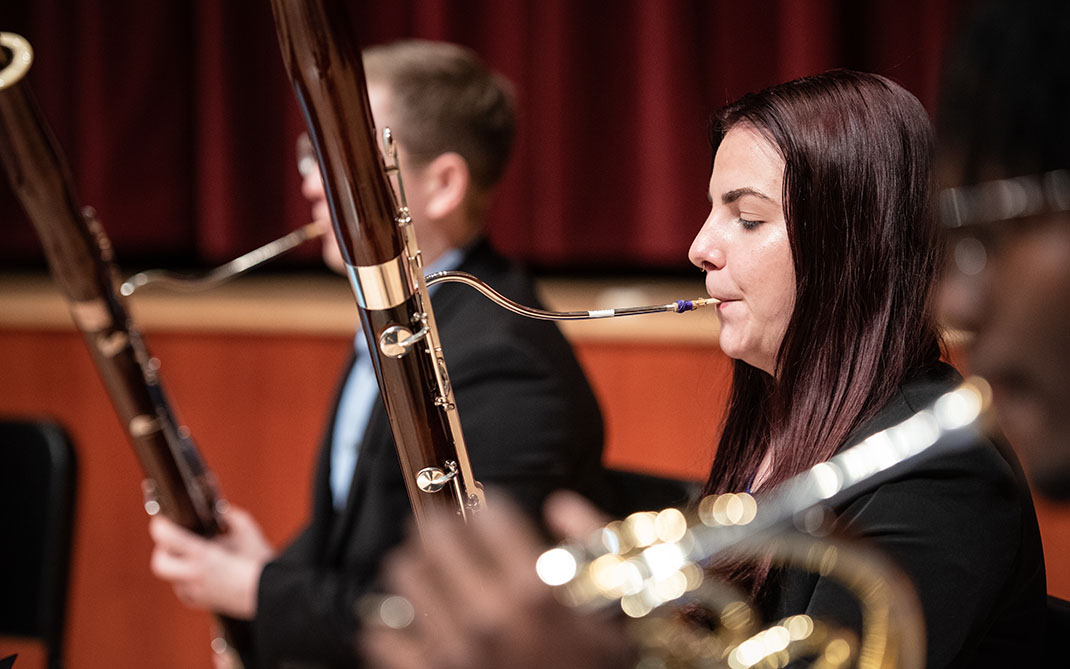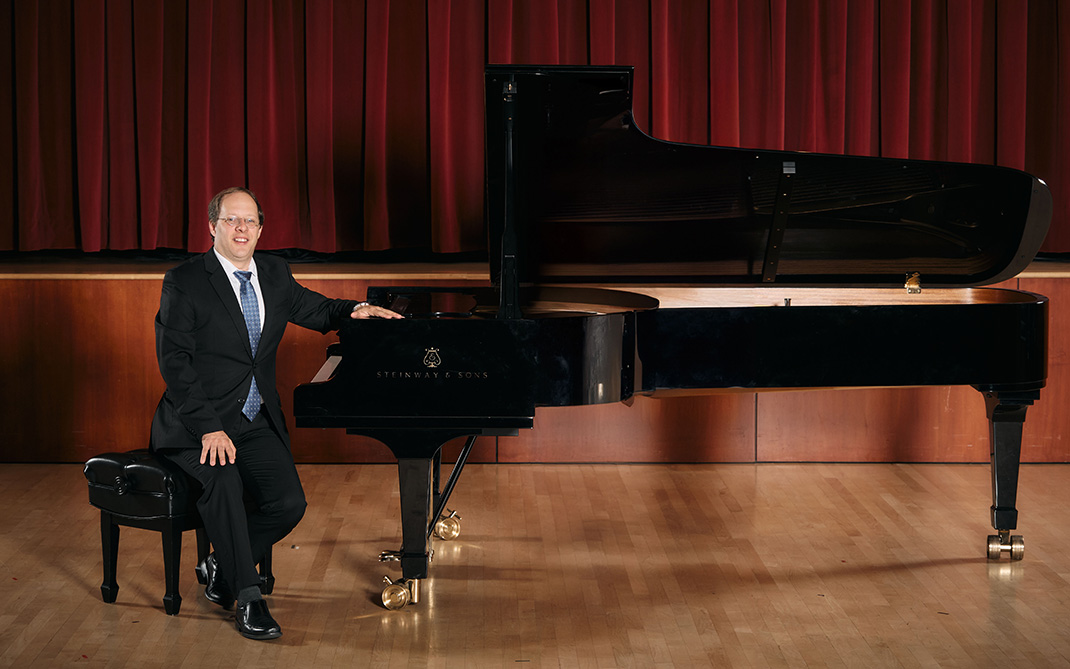Updates from the UNC Board of Governors
Dear UNCSA Community,
I am writing to share with you my report from the February 2024 meeting of the UNC
Board of Governors at the UNC System headquarters in Raleigh, which I returned from
Thursday. As I have mentioned previously, the purpose of these messages is to highlight
some of the important UNC System initiatives and decisions coming out of each meeting
of the UNC Board of Governors, giving quick access to topics that may be of particular
interest to the UNCSA community. All materials from each meeting are published on the web, and all committee and full board meetings are livestreamed on PBS North Carolina. The full board meetings are also archived for later viewing.
As a reminder, each year two of the annual meetings of the UNC Board of Governors
are hosted on the campuses of constituent institutions, and this year UNCSA will be
one of those institutions. Next month we will welcome the UNC System leadership, members
of the Board of Governors and institutional delegations to our campus for the meetings
on April 17-18, 2024, and look forward to the opportunity to show them the vibrancy
and importance of the work that we do at UNCSA.
Sincerely,
Brian Cole
Chancellor
General Meeting of the Board of Governors
Feb. 29, 2024 – full agenda and meeting materials
- The full consent agenda was passed.
- The winners of the 2023 Governor James E. Holshouser, Jr. Awards for Excellence in
Public Service were announced:
- Kuldeep Rawat, Marion D. Thorpe Endowed Professor, dean of science, aviation, health and technology, and director of aviation science, Elizabeth City State University
- Michael R. Smith, dean emeritus of the School of Government, professor of law and government, University of North Carolina at Chapel Hill
- In his report, President Peter Hans focused on conversations he has been having with campus and student leaders about the growing concern of the impact of social media on student mental health and wellness. Much of those conversations centered around a new generation of social media apps designed with geolocation that are being used on college campuses to anonymously target individuals, increasing exposure to bullying, sexual harassment and racism. He informed the board that he is directing UNC technology teams to block these apps (such as Yik Yak, Fizz, Whisper and Sidechat, among others) from using university networks. To hear President Hans’ report in full, I encourage you to go to the 31:46 mark in the broadcast video.
- During the report from the Committee on Educational Planning, Policies, and Programs, Wade Maki, chair of the Faculty Assembly, shared his report, in which he discussed the feedback regarding the ROI study and the Foundation for American Democracy policy, with a particular focus on process and implementation. I encourage faculty members to view Chair Maki’s full report at the 46:59 mark in the broadcast video.
Budget and Finance Committee
Feb. 28, 2024 – full agenda and materials; additional materials
-
Chief Financial Officer and Senior Vice President for Finance and Administration Jennifer Haygood presented the proposed tuition and fee increases submitted by campuses for the 2024-25 academic year. These increases were passed unanimously by the committee and forwarded to the full board for approval. As a reminder, UNCSA has not submitted any tuition and fee increases this year. (See agenda items A-2 and A-3.)
Joint meeting of the committees on Budget and Finance and Public Affairs
Feb. 28, 2024 – full agenda and materials
- Senior Vice President Haygood presented the draft of the UNC System’s operating budget priorities for the short session of the N.C. General Assembly this spring, which concentrate on a limited number of critical needs focused on implementing the board-approved performance-weighted funding model, targeting financial aid to increase on-time graduation, addressing key enterprise risks, and responding to labor market pressures. The final recommended priorities will be presented to the committee and to the full board at the April meeting.
- Performance funding is a new component of the UNC System Funding Model, designed to align funding for UNC System schools with measurable performance and student success outcomes. It operates based on five core metrics applicable to all constituent institutions within the UNC System: Four-Year Graduation Rate, Undergraduate Degree Efficiency, First-Time Student Debt at Graduation, Transfer Student Debt at Graduation, and Education & Related Expenses per Degree. Additionally, each university selected one campus-specific performance metric; for UNCSA, this is the Four-Year Graduation Rate for Pell students. This funding model incentivizes universities to excel across specific key performance indicators, as their funding allocation is directly tied to overall performance within these metrics. However, it is crucial for performance funding to be recurring to adequately meet ongoing institutional needs. Recurring funding ensures stability and consistency, allowing institutions to address essential recurring requirements such as faculty and staff salary increases, financial aid awards, creation of new positions, and adjustments for inflation within operating expenses. By making the performance funding a recurring budget item, universities can reliably plan and allocate resources to sustain and enhance their educational missions.
- The proposed focus on a Labor Market Adjustment Fund (LMAR) would bring back a resource that was given to public institutions last year for the first time in history, which was a pool of funds equal to 1% of the institution’s salaries budget to be able to address recruitment and retention issues for hard-to-fill positions. The LMAR fund was created again this year in the state budget for all agencies except the UNC and Community College systems, and System leadership will request that the fund be extended to higher education.
Educational Planning, Policies, and Programs Committee
Feb. 28, 2024 – full agenda and materials
- Senior Vice President for Academic Affairs David English presented the final proposal
for a revision to policy 400.1.5, “Fostering Undergraduate Student Success,” which
would create a new UNC System requirement to “ensure that undergraduate students acquire
a shared foundation in American democracy in a manner that emphasizes academic rigor
and freedom of inquiry and that is implementable across all UNC System institutions.”
(See agenda item A-4 for a full redline version of the proposal.)
- Senior Vice President English mentioned that the faculty workgroup had received a substantial amount of feedback from faculty and campus leaders and had worked to address as many of those concerns as possible in the final proposal.
- UNC Faculty Assembly Chair Wade Maki, a member of the task force, indicated that he had met with faculty leaders from each campus as well as had conversation with faculty groups from six institutions in the process of gathering feedback.
- The proposal was passed unanimously by the committee and will be forwarded to the full board for approval on the consent agenda in the April meeting.
- Senior Vice President English and Senior Vice President for Strategy and Policy Andrew
Kelly continued the discussion on the need for the Board of Governors to vote on whether
the UNC System will extend its waiver on required SAT and ACT test scores for prospective
students. During the COVID-19 pandemic the board voted to allow schools to waive the
test scores. That waiver will expire after the current fall 2024 admissions cycle.
- The System Office presented a draft proposal that would:
- By fall 2025 require test scores from students with a GPA between 2.5 and 2.8.
- By fall 2026 enable students between 2.5 and 2.8 to “test in” by providing evidence of readiness (ACT>17 or SAT>930).
- Enable individual campuses to require tests of all applicants, conditional on approval of the president and Board of Governors.
- The System Office presented a draft proposal that would:
- The presentation was for discussion only and the committee will vote on the matter at the April meeting. (See agenda item A-5 for a redline version of the proposal and the full slide presentation.)
Joint meeting of the committees on Strategic Initiatives and Educational Planning, Policies, and Programs
Feb. 28, 2024 – full agenda and materials
- Senior Vice Presidents Kelly and English led a discussion about the next steps and implementation of the Board of Governors response to the ROI study, and its potential applications in the future with periodic program review. (See agenda item A-3 for the full slide presentation.)
- SVP Kelly gave a summary of UNC’s current approval policy, how program review could
be approached with more consistency, and examples of how other university systems
are approaching it across the country. He presented the following three areas for
proposed reform:
- Institutionalizing a focus on student ROI in program development and review.
- Empowering campus leaders to engage in regular academic program review processes.
- Strengthening and clarifying the System Office’s obligations regarding program assessment and the needs of the state.
- The proposal includes a seven-year cycle for campus-based program review that seeks
to:
- Clarify roles for the board, system and institutions.
- Assess the needs of the state.
- Establish principles for program development, which would include student ROI as one of 12 factors.
- The next steps will be to send a draft proposal to campuses in March for feedback, which will then be incorporated into an official proposal to the board to be discussed and voted on at the April meeting.
Past BOG Updates
March 04, 2024





